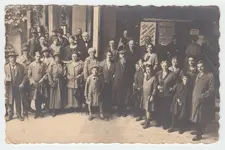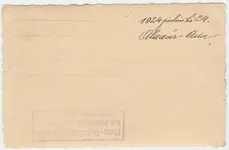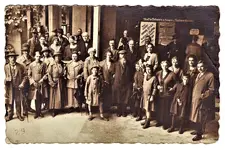DaftCharlie
Tenderfoot
Obsessed with researching this postcard and thought I'd reach out for some extra help. Dated 29 JUL 1924
I'm bouncing back and forth between Germany (I took a microscope to the posters and one mentions a lovely evening at Staatliches Bauhaus), Hungary (the handwritten message on the back), and Serbia (At first I thought Ada on the back was a name - like "this is Adalar and Ada" but after some research discovered a small area in the Belgrade area named Ada which has a large Hungarian population).
Sadly the photographer doesn't help much (Georg Lampe - Bad Reichenhall) but does make me lean more toward Germany, especially when I scoped in on the signs and made out Bauhaus, etc.
I've tried to do some research on the posters and even did some side-by-side research of the building they're in front of (particularly with Bauhaus which it could NEARLY match up with but is not).
I'd also love to learn more about the image itself. Was it common for families to hang out like this and have a drink (I love the glasses)? Any idea what kind of gathering this may have been or just a typical evening out?
Thanks in advance for your help!



I'm bouncing back and forth between Germany (I took a microscope to the posters and one mentions a lovely evening at Staatliches Bauhaus), Hungary (the handwritten message on the back), and Serbia (At first I thought Ada on the back was a name - like "this is Adalar and Ada" but after some research discovered a small area in the Belgrade area named Ada which has a large Hungarian population).
Sadly the photographer doesn't help much (Georg Lampe - Bad Reichenhall) but does make me lean more toward Germany, especially when I scoped in on the signs and made out Bauhaus, etc.
I've tried to do some research on the posters and even did some side-by-side research of the building they're in front of (particularly with Bauhaus which it could NEARLY match up with but is not).
I'd also love to learn more about the image itself. Was it common for families to hang out like this and have a drink (I love the glasses)? Any idea what kind of gathering this may have been or just a typical evening out?
Thanks in advance for your help!





